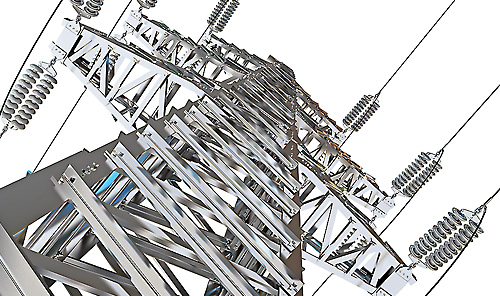Utilities’ Role in the Corporate Location Decision
Conveying a company’s utility needs to service providers and choosing a location that can properly meet those needs — now and into the future — will help to ensure a project’s success.
Q2 2019

While utility cost and capacity are not ranked as high as workforce, transportation, and labor costs, one could argue that utilities and their associated costs are just as important when deciding to locate a new and/or expand a manufacturing or distribution facility. Utility providers need to be fully aware of this fact and can be an asset in how they assist in the overall site selection process. Outlined below are several ways in which utility providers can be of benefit in the location decision:
Availability and Cost
By far the most important way the utility company can assist with site selection is fully understanding the service availability and excess capacity to all sites and available buildings in the community and/or communities served. If there is no current excess capacity, the utility company needs to have a plan in place to expand that capacity in a given area, depending on growth patterns.
Installing new service or adding capacity is not an overnight process. It requires weeks — and, in most instances, months — to complete the entire process, which includes several layers of approvals, cost/benefit analyses, and easement procurements. Specifically, it is easy to fall into a trap: just because a site has “access” to a certain utility doesn’t mean that the utility can serve the site.
By far the most important way the utility company can assist with site selection is fully understanding the service availability and excess capacity to all sites and available buildings in the community and/or communities served. Knowing up front what the project will demand or consume in terms of electrical, water, sewer, natural gas, and telecommunication services will easily vet the site to determine if that location should be considered for the project. All potential sites should be thoroughly vetted before a tour is put together. Keep in mind that any costs for extending utility service or adding capacity are typically passed along to the client, and these costs need to be calculated up front to determine the feasibility of the project. The last thing you want to do is visit the site and then realize that the water pressure is inadequate and there needs to be a water tank installed on the site to accommodate the sprinkler system in the building.
Incentives and/or Grants
Should the proposed project require adding new or expanded service to meet a minimum demand, many states and communities offer incentives to eliminate or defray costs to the company or developer preparing the building or site for the occupant. The grants can be paid up front or over a certain period and are paid directly to the company. Types of eligible expenditures for the grant can be anything from the extension of water, sewer, natural gas, or rail service to obtaining and installing a transformer for electrical service.
Typically, these incentives are performance-based, and the company taking advantage of these grants will be required to create and maintain new jobs and investment for a specified time period. Other incentives from utility companies could include rebates (often on a sliding scale over a certain time period) based upon the company’s utility usage, which certainly can be advantageous for a company during the beginning stages of a project.
Again, knowing the project requirements up front is paramount to maximizing any incentives and/or grants that could be made available for the project.
Site Evaluation Assistance
One of the more common value adds that a utility company provides to a state or community, which in turn assists the company considering a site, is help in evaluating a potential site and determining if it is suitable for development. As development of a site is a timely process, most corporate site selection projects will quickly eliminate sites that do not have even the basic information readily available.
Knowing up front what the project will demand or consume in terms of electrical, water, sewer, natural gas, and telecommunication services will easily vet the site to determine if that location should be considered for the project. This is where the utility companies are helpful in bridging the gap. Many utility companies provide funding to communities and or local economic development organizations to assist with having the basic due diligence activities performed on the sites within a county or city in which they provide service. Typically, the due diligence will include verification of zoning and location of electricity, water, sewer, and natural gas along with their corresponding capacities. Additionally, high-level mapping will be provided that outlines any possible wetland, easements, and topographical challenges. Taking the process one step further would be a Phase 1 environmental site assessment and some limited geotechnical testing to determine the suitability of the underlying soil on the site.
Having these deliverables readily available at the initial request for information phase and initial site visit will certainly help in understanding the site much quicker and perhaps keep it from a quick elimination.
In Sum
A community might have all the attributes for a new plant or distribution center (labor availability and favorable labor cost, transportation, etc.) but could fall short on a property with the required utility service for the new location. Being prepared with specific knowledge of utility extension, capacities, and approvals in place can help a community in winning the project.
Conversely, companies working with site selection professionals need to fully understand their own utility needs not only for the project at hand but also for some level of growth at the new facility. If a community can handle the utility needs of today but not allow for growth, then the project needs to consider alternative locations.
Project Announcements
Australia-Based Aquatic Leisure Technologies Group Plans Opp, Alabama, Manufacturing Operations
12/11/2025
Teradyne Plans Wixom, Michigan, Robotics Operations
12/11/2025
Robinson Plans Altoona, Iowa, Manufacturing Operations
12/11/2025
BioTouch Expands Columbus, Georgia, Operations
12/11/2025
Natrion Plans Erie County, New York, Battery Components Operations
12/11/2025
Czech-Based GZ PrintPak Expands Mount Pleasant, Wisconsin, Manufacturing Operations
12/11/2025
Most Read
-
The Workforce Bottleneck in America’s Manufacturing Revival
Q4 2025
-
Rethinking Local Governments Through Consolidation and Choice
Q3 2025
-
First Person: Filter King’s Expansion Playbook
Q3 2025
-
Lead with Facts, Land the Deal
Q3 2025
-
How Canada Stays Competitive
Q3 2025
-
Investors Seek Shelter in Food-Focused Real Estate
Q3 2025
-
America’s Aerospace Reboot
Q3 2025



